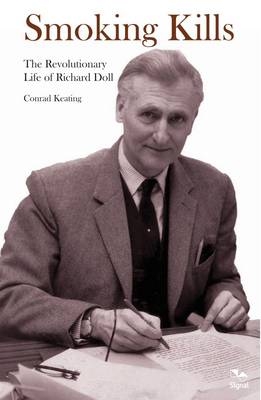
Smoking Kills
The Revolutionary Life of Richard Doll
Seiten
2014
Signal Books Ltd (Verlag)
978-1-909930-04-9 (ISBN)
Signal Books Ltd (Verlag)
978-1-909930-04-9 (ISBN)
The authorised biography of the doctor who made the link between smoking & lung cancer and battled Big Tobacco
At the end of the Second World War, Britain had the highest incidence of lung cancer in the world. For the first time lung cancer deaths exceeded those from tuberculosis - and no one knew why. On 30 September 1950, a young physician named Richard Doll concluded in a research paper that smoking cigarettes was "a cause and an important cause" of the rapidly increasing epidemic of lung cancer. His historic and contentious finding marked the beginning of a life-long crusade against premature death and the forces of "Big Tobacco". Born in 1912, Doll, a natural patrician, jettisoned his Establishment background and joined the Communist Party as a reaction to the "anarchy and waste" of capitalism in the 1930s. He treated the blistered feet of the Jarrow Marchers, served as a medical officer at the retreat to Dunkirk, and became a true hero of the NHS. A political revolutionary and an epidemiologist with a Darwinian heart-of-stone, Doll fulfilled his early ambition to be "a valuable member of society". Doll steered a course through a minefield of medical and political controversy.
Opponents from the tobacco industry questioned his science, while later critics from the environmental lobby attacked his alleged connections to the chemical industry. An enigmatic individual, Doll was feared and respected throughout a long and wide-ranging scientific career which ended only with his death in 2005. In this authorised and groundbreaking biography, Conrad Keating reveals a man whose life and work encapsulates much of the twentieth century. Described by the British Medical Journal as "perhaps Britain's most eminent doctor", Doll ushered in a new era in medicine: the intellectual ascendancy of medical statistics. According to the Nobel laureate Sir Paul Nurse, his work, which may have prevented tens of millions of deaths, "transcends the boundaries of professional medicine into the global community of mankind."
At the end of the Second World War, Britain had the highest incidence of lung cancer in the world. For the first time lung cancer deaths exceeded those from tuberculosis - and no one knew why. On 30 September 1950, a young physician named Richard Doll concluded in a research paper that smoking cigarettes was "a cause and an important cause" of the rapidly increasing epidemic of lung cancer. His historic and contentious finding marked the beginning of a life-long crusade against premature death and the forces of "Big Tobacco". Born in 1912, Doll, a natural patrician, jettisoned his Establishment background and joined the Communist Party as a reaction to the "anarchy and waste" of capitalism in the 1930s. He treated the blistered feet of the Jarrow Marchers, served as a medical officer at the retreat to Dunkirk, and became a true hero of the NHS. A political revolutionary and an epidemiologist with a Darwinian heart-of-stone, Doll fulfilled his early ambition to be "a valuable member of society". Doll steered a course through a minefield of medical and political controversy.
Opponents from the tobacco industry questioned his science, while later critics from the environmental lobby attacked his alleged connections to the chemical industry. An enigmatic individual, Doll was feared and respected throughout a long and wide-ranging scientific career which ended only with his death in 2005. In this authorised and groundbreaking biography, Conrad Keating reveals a man whose life and work encapsulates much of the twentieth century. Described by the British Medical Journal as "perhaps Britain's most eminent doctor", Doll ushered in a new era in medicine: the intellectual ascendancy of medical statistics. According to the Nobel laureate Sir Paul Nurse, his work, which may have prevented tens of millions of deaths, "transcends the boundaries of professional medicine into the global community of mankind."
Conrad Keating is the Writer-in-Residence at the Wellcome Unit for the History of Medicine at Oxford University. As a professional historian he has written for newspapers, radio and television. Born in Ireland he has lived much of his life in the UK.
| Erscheint lt. Verlag | 1.7.2014 |
|---|---|
| Zusatzinfo | 20 b&w illus |
| Verlagsort | Oxford |
| Sprache | englisch |
| Maße | 133 x 203 mm |
| Themenwelt | Literatur ► Biografien / Erfahrungsberichte |
| Sachbuch/Ratgeber ► Natur / Technik | |
| Studium ► Querschnittsbereiche ► Epidemiologie / Med. Biometrie | |
| Studium ► Querschnittsbereiche ► Geschichte / Ethik der Medizin | |
| ISBN-10 | 1-909930-04-0 / 1909930040 |
| ISBN-13 | 978-1-909930-04-9 / 9781909930049 |
| Zustand | Neuware |
| Haben Sie eine Frage zum Produkt? |
Mehr entdecken
aus dem Bereich
aus dem Bereich
ein überfälliges Gespräch zu einer Pandemie, die nicht die letzte …
Buch | Hardcover (2024)
Ullstein Buchverlage
CHF 34,95


